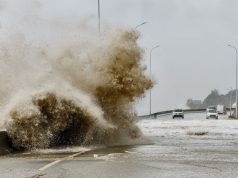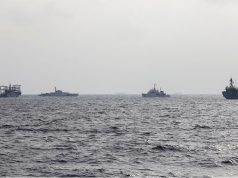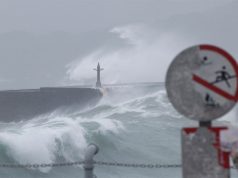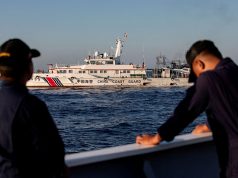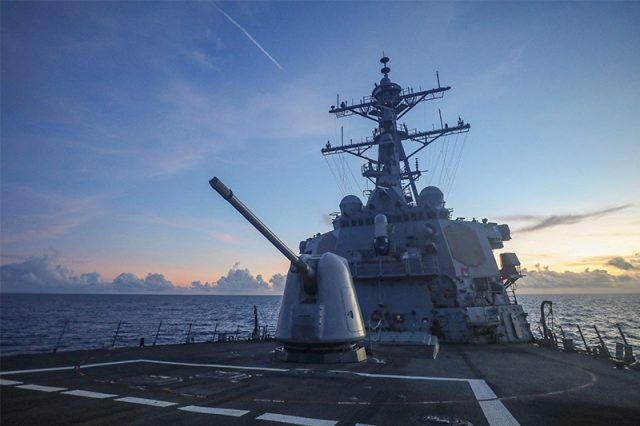
- Japan, Australia would like to join joint patrols – ambassador
- Washington pleased with Marcos’ actions against China
- South China Sea world’s ‘most complicated geopolitical situation’ -Marcos
- Marcos re-aligning with U.S. after predecessor strained ties
MANILA— The Philippines is in talks to possibly include Australia and Japan in planned joint South China Sea patrols with the United States, a senior diplomat said on Monday, in another sign of concern over Beijing’s activities in the strategic waters.
“Meetings have already been set and probably we may have the Japanese and the Australians join in,” Philippine Ambassador to the United States Jose Manuel Romualdez told Reuters.
“They would like to join in for joint patrols to make sure that there’s the code of conduct and there’s freedom of navigation,” adding it was still “an idea under discussion”.
If the plan materializes, it will be the first time the Philippines has joined multilateral maritime patrols in the South China Sea, a move that would likely anger Beijing, which claims most of the sea as its territory.
The foreign ministries of Australia and Japan and the embassies of the United States and China in Manila did not immediately respond to separate requests for comment.
The patrol talks and renewed engagement with the United States underscore how much Philippine President Ferdinand Marcos Jr. has realigned his country with its historic ally, moving away from predecessor Rodrigo Duterte’s hostile approach to Washington while still pursuing close economic engagement with regional powerhouse China.
Australia and the United States have separately been discussing joint patrols with the Philippines, amid concerns about China’s assertiveness in the South China Sea, through which about $3.4 trillion of commerce passes each year.
The United States, Japan and Australia have been conducting trilateral naval exercises, and joint patrols with those countries would be “good for the Philippines and for the entire area”, Romualdez said, adding: “We want to have freedom of navigation.”
‘These are our allies’
The patrols “could be initially country-to-country” and expanded eventually “because these are our allies, like-minded countries”, he said.
The prospect of a four-country bloc patrolling together in the waters would send a unified message to China, which maintains a constant presence of hundreds of vessels across the South China Sea to assert its claims.
China is accused by some Southeast Asian neighbors of deploying its coast guard and a maritime militia to bully their fishermen and disrupt resupply missions and energy exploration. China maintains it is protecting its historic territory.
“For the Philippines, it allows us an alternative partner to counter China aside from U.S.,” Rommel Jude Ong, former vice commander of the Philippine navy, said of the prospect of patrols.
“Whether we like it or not, we need to calibrate our activities with the U.S. also to make sure we do not get drawn to issues that solely reside between the U.S. and China.”
Australian Defense Minister Richard Marles last week said Australia wanted to expand its bilateral defense relationship with the Philippines and joint patrols were “the next step”.
RELATED: Australia, Philippines discuss joint patrols in South China Sea
Japan, Australia and the United States are among dozens of countries that recognize a landmark arbitration case in 2016 won by the Philippines that invalidated China’s expansive territorial claim.
Beijing does not recognize the ruling. It says it respects freedom of navigation but opposes actions that undermine what it considers its sovereignty.
‘Extremely pleased’
With some overlapping maritime claims, the Philippines has been ramping up rhetoric to challenge what it calls illegal Chinese activities in its exclusive economic zone.
It has made 77 complaints to China since Marcos took office in June last year. This month, he summoned the Chinese ambassador, concerned about “aggressive” Chinese maritime actions.
“Washington is extremely pleased that the Philippines is taking a stronger stand in its territorial rights,” added ambassador Romualdez, who is relative of Marcos.
The move is a stark departure from predecessor Duterte’s open disdain for the United States and efforts to appease China. Duterte was widely criticized for being reluctant to press China to abide by the arbitration ruling, concerned it could hurt investment.
Marcos on Monday described the South China Sea issue as “the most complicated geopolitical situation in the world”.
“There was a time where we did not have to worry about these threats and the intensification of the competition between the superpowers,” he said in a speech to soldiers.
Early this month, Marcos granted the United States greater access to Philippine military bases by adding four more sites, on top of five existing locations, under the 2014 Enhanced Defense Cooperation Agreement, or EDCA, an agreement predecessor Duterte had threatened to scrap.
EDCA allows U.S. access to Philippine bases for joint training, pre-positioning of equipment and building of facilities such as runways, fuel storage and military housing, but not a permanent presence.
Romualdez, who was also ambassador under Duterte, said recent developments showed “the relationship between the United States and the Philippines today is definitely at its best”.
—Additional reporting by Kirsty Needham in Sydney; Editing by Martin Petty and Nick Macfie




